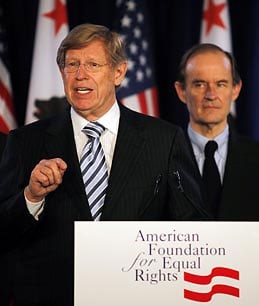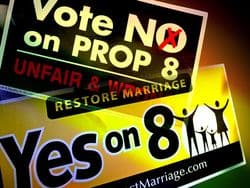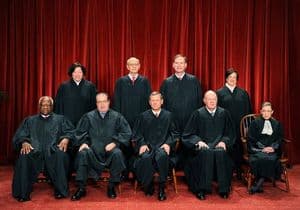This is the first in a series of analyses about the Supreme Court's decision to hear cases challenging the constitutionality of the Defense of Marriage Act and Proposition 8. Today's discussion: The Prop 8 grant.
In all quests for change, the central strategic questions are the same: How fast do we go and how far do we reach? It is no less true in our community, where advocates wrestle with the strategic risks and rewards of going for the gold today or setting incremental, but what they see as more attainable goals.
 This debate played out in the months and weeks leading up to the decision to bring a federal challenge to California's Proposition 8. Some gay rights advocates worried that bringing a direct challenge to the marriage ban too soon — before the country was ready, before any "emerging consensus" on the matter, and before any appreciably significant turnover in the Supreme Court — could result in a negative decision that, like Bowers v. Hardwick's acceptance of anti-sodomy laws, set back our quest for equal dignity. Lawyers are trained to be cautious like that: don't bring a case you can't win, we're taught. But, with the Supreme Court deciding to hear Hollingsworth v. Perry, the supposedly too-fast, too-soon challenge to Prop 8 brought by the American Foundation for Equal Rights (AFER), many of those jitters are coming back to the fore.
This debate played out in the months and weeks leading up to the decision to bring a federal challenge to California's Proposition 8. Some gay rights advocates worried that bringing a direct challenge to the marriage ban too soon — before the country was ready, before any "emerging consensus" on the matter, and before any appreciably significant turnover in the Supreme Court — could result in a negative decision that, like Bowers v. Hardwick's acceptance of anti-sodomy laws, set back our quest for equal dignity. Lawyers are trained to be cautious like that: don't bring a case you can't win, we're taught. But, with the Supreme Court deciding to hear Hollingsworth v. Perry, the supposedly too-fast, too-soon challenge to Prop 8 brought by the American Foundation for Equal Rights (AFER), many of those jitters are coming back to the fore.
My friend Emily Bazelon recently wrote in Slate that she's "more than a little anxious" about this Court hearing the Prop 8 case. NYU Law Professor Kenji Yoshino's interviews on TV express muted confidence and imply that "it'll all come down to Justice Kennedy." Professor Yoshino is a titan, but even he can't hide how risky that sounds.
The Prop 8 case at the Supreme Court is indeed a high risk/high reward situation. But, it is a lower risk today than it was in 2008 for at least three reasons, one of which is a little legalistic and arcane.
1. Though the risk has a lot to do with the breadth of the question framed by the Court's grant, a broad question is not an automatic path to a broad decision.
2. The country has changed more in the last 4-8 years on gay rights than many of us imagined was possible. In particular, the political victories last month in which 3 states voted for the freedom to marry and 1 state beat back a ban have changed the narrative on the popular will.
3. Those changes happened, in large part, because AFER brought its case and won two lower court decisions, while Lambda Legal, the ACLU, and the National Center for Lesbian Rights were winning DOMA cases.
AFTER THE JUMP, I tease out the first of these reasons (I've spoken about the political winds before), show that the Supreme Court did more than just grant a hearing in the Prop 8 case, and explain how the particular manner of its grant is going to shape our strategy going forward.
CONTINUED, AFTER THE JUMP…
On Friday, the Supreme Court didn't just say, "hey, yeah, we'll take the case." It said that it will grant a hearing in Perry to answer two very specific questions:
1. Whether California can define marriage as a union between one-man and one-woman and be consistent with the Fourteenth Amendment to the U.S. Constitution.
2. Whether the Prop 8 proponents have Article III standing to bring the case?
Question 1 is what's giving people angst. Question 2 is what some are calling an "opt out" clause. I'd like to show how both assessments are off the mark.
The Angst
When the Ninth Circuit issued its narrow ruling in Perry, holding that the reason Prop 8 had to go was because it took away rights previously granted, many experts saw this as a way to let the Supreme Court take an incremental step toward marriage freedom without invalidating every single marriage ban out there. That decision was based on a particular, though by no means rock solid, interpretation of Romer v. Evans, which held that a provision of the Colorado Constitution that took away the rights of pro-gay advocates to seek protection for discrimination at any level of government save re-amending the state constitution was unconstitutional.
The Supreme Court's question is much broader than, say, "Whether California violated the 14th Amendment by taking away the right to marry from gay persons." And, by framing the legal arguments around the broader scope of the original district court decision, in which Judge Vaughn Walker declared the marriage ban to be a violation of the 14th Amendment regardless of the manner in which it happened, there certainly is the possibility that the Court could come back and hold that a one-man, one-woman definition does not violate the 14th Amendment. That decision would hurt us because it would not only affirm California's ban, but those in every other state.
The Angst is Understandable, but Unwarranted
For the same reason that I do not think the Court is ready to hand down a nationwide right to marry for all, I also think the Court is not willing to enshrine marriage discrimination in the Constitution if a state wants it. Here's why:
There is a great debate going on in this country about the freedom to marry and it's a debate whose tide has turned, with a consensus emerging that it is not only okay to let gays marry, but also a good thing. Even the conservative George Will thinks it's just about a done deal. But, as the debate rages, the Court is less likely going to be willing to step in and make a clear statement cutting that debate short. Even when it decided Loving v. Virginia in 1967, it only had to invalidate 16 state laws and the national consensus was against these laws for the most part. And, when it decided Griswold v. Connecticut in 1965, it only had to invalidate a few state anti-contraception laws and even those had stopped being enforced.
Plus, the Court has generally supported incremental change rather than wholesale legal revolution. That's probably a good thing: stability in the law breeds order, respect, and economic and social growth. And, this preference for slow and steady change does not mean the Court would reject DOMA but uphold Prop 8. That's too easy and fails to understand the legal arguments behind incremental change and the Prop 8 case, in particular. Incremental change is more likely to happen when the Court rejects DOMA and rejects Prop 8, while limiting the scope of its Prop 8 decision.
The central reason not to worry is this: A broad question does not necessarily require a broad answer. The Court is giving itself the space to decide what it needs to decide and it can choose a holding that fits anywhere within the spectrum between nothing and everything. It's like buying a gallon of ice cream: Just because you bought the whole thing doesn't mean you have to eat it all in one sitting.
 There are, in fact, three ways the Court could reject Prop 8 without diving into the deep end.
There are, in fact, three ways the Court could reject Prop 8 without diving into the deep end.
1. Use procedure. The second question posed by the Court is the standing question. Do the Prop 8 Proponents, the citizens of California who authored and ran the political campaign to enact the marriage ban, have standing under Article III of the Constitution to step into the shoes of the State of California after California refused to defend Prop 8?
We talked about this quite a bit when the case was at the Ninth Circuit. If you recall, California did not want to defend Prop 8, so the proponents of the initiative took the State's place. Do initiative proponents have standing? It's a question about who has to show that they were harmed: do the proponents have to show that allowing gays to marry hurts them (they couldn't show that in a "particularize[d]" way, as is the requirement to bring a federal case), or do we just have to show that the state was adversely affected and that proponents could step into the state's shoes?
The California Supreme Court said that California state law allowed initiative proponents to take the place of the state and this allowed the Ninth Circuit to grant standing on the latter theory and distinguish some language from a Supreme Court case called Arizonans for Official English v. Arizona. In that case, the Court expressed "grave doubts" that random citizens who happen to be initiative proponents could have standing. But, in California, the law says they could; in Arizona, the law never granted that authority.
That holding was clever and sound, but by no means the final word on the matter. The Supreme Court could disagree with the Ninth Circuit's analysis of Arizonans and find that on any standing theory, the proponents lacked it. Though, because the Court would have to accept the California Supreme Court's word as a binding interpretation of state law — state courts are experts on state law, federal courts are expects on federal law — a rejection on standing would be based on the Arizonans "grave doubt."
If this happens, the district court decision would be reinstated, Judge Walker's order goes into effect, and gays could marry in California.
2. Use the Ninth Circuit's substance. If the procedural path is like buying a gallon of ice cream and then realizing you have no clean spoons to eat it with, the substantive path is like buying the gallon, taking two scoops, and saving the rest for later.
The Supreme Court could answer its broad question in the same way the Ninth Circuit did: "No, California cannot define marriage as a union of one-man, one-woman only because California cannot be in the business of taking away rights merely to burden a particular disadvantaged subgroup of people." That would be specific to California.
The problem with just affirming the Ninth Circuit's decision is that it really isn't the most sound legal decision. It relied on Romer, which took away decidedly more rights — the power to use the levers of political power at all levels of state government to fight for protection against discrimination. It was the sheer breadth of what Colorado took away that generated the inference of animus toward gays, not simply the taking away of something. All Prop 8 took away was the word "marriage." This fact required the Ninth Circuit to spend quite a bit of column inches on why the word "marriage" is so important. And, that word is "important." But, Prop 8 left everything else in place. All the rights and privileges the state gives to heterosexual married couples would still be given to gay domestic partners. That wrinkle makes the argument iffy.
Still, the idea isn't off the mark. There are plenty of other decisions in the "taking away of rights" area that could lend credibility to the theory. So, all the Supreme Court would have to do is take its two scoops and add the ooey-gooey toppings the Ninth Circuit left off. Like the procedural path above, this would allow marriages to start in California — and in California alone — almost immediately.
3. Take a different limited path. Professor Yoshino deserves credit for reminding me about another option. If improving upon the Ninth Circuit's decision is like having two scoops of the gallon of ice cream you bought, this would be like buying the gallon of vanilla and having two scoops of the pint of chocolate you bought, as well.
What is unique about California is that Prop 8 created an "everything but marriage" situation. There are a few other states like that:
Delaware, Hawaii, Illinois, Nevada, New Jersey, Oregon, and Rhode Island. Oddly, as I have argued before, the "everything but" marriage status makes the least sense of any marriage ban; it would be more rational if a state discriminated against gays in every way possible than treated them equally in 99 out of 100 respects. Think about it: how could you legitimately argue that you think gays marrying will have this or that negative effect on children or education or divorce rates if you already let gays adopt, raise children, and divorce. You stand to make more sense if you were actually consistent in your hatred of gays. Disgusting, no doubt, but at least consistent.
To be fair, I don't think this is a likely result. Neither does Professor Yoshino. But, it could give you a window into the myriad options the Supreme Court has. Just because it took the Prop 8 case and took it broadly does not mean that we are poised for a Bowers v. Hardwick type loss. The political winds and the law are on our side.
Conclusion
Let me be clear: I am not predicting that the Court will choose one of these options over the other two. I don't have a crystal ball and I don't gamble. I tried to show that the Court has options between a nationwide right to marry and a nationwide block on gays marrying. The lesson here: Keep calm, and carry on.
***
Ari Ezra Waldman teaches at Brooklyn Law School and is concurrently getting his PhD at Columbia University in New York City. He is a 2002 graduate of Harvard College and a 2005 graduate of Harvard Law School. His research focuses on technology, privacy, speech, and gay rights. Ari will be writing weekly posts on law and various LGBT issues.
Follow Ari on Twitter at @ariezrawaldman.




